Bariatric Surgery and Dietary Approaches for Diabetes Remission
VerifiedAdded on 2020/06/05
|28
|5523
|68
Report
AI Summary
This report investigates the comparative effectiveness of bariatric surgery and dietary approaches in achieving remission of type 2 diabetes in obese patients. The methodology includes a review question, PICOT framework, search strategy with keywords, inclusion and exclusion criteria, and a focus on randomized control trials (RCTs) using databases like Pubmed, Science Direct, and The Cochrane Library. The results section synthesizes findings from multiple studies, including those by Mottalib et al. (2015), Kashyap et al. (2013), Dixon et al. (2008), Schauer et al. (2012), Mingrone et al. (2015), Lee et al. (2011), and Dunn et al. (2012), highlighting the superior efficacy of bariatric surgery, particularly gastric bypass, in achieving glycemic control and weight loss compared to dietary interventions alone. The discussion emphasizes that bariatric surgery, including both sleeve gastrectomy and gastric bypass, is the most effective intervention for diabetes remission, although the report acknowledges that lifestyle intervention can also help in the remission of type 2 diabetes. The report concludes with a recommendation for gastric bypass surgery within the context of bariatric surgery, based on the evidence presented, as a more effective method for achieving diabetes remission compared to conventional medical methods and sleeve gastrectomy for weight reduction and glycemic control.

HEALTH
RESEARCH
RESEARCH
Paraphrase This Document
Need a fresh take? Get an instant paraphrase of this document with our AI Paraphraser
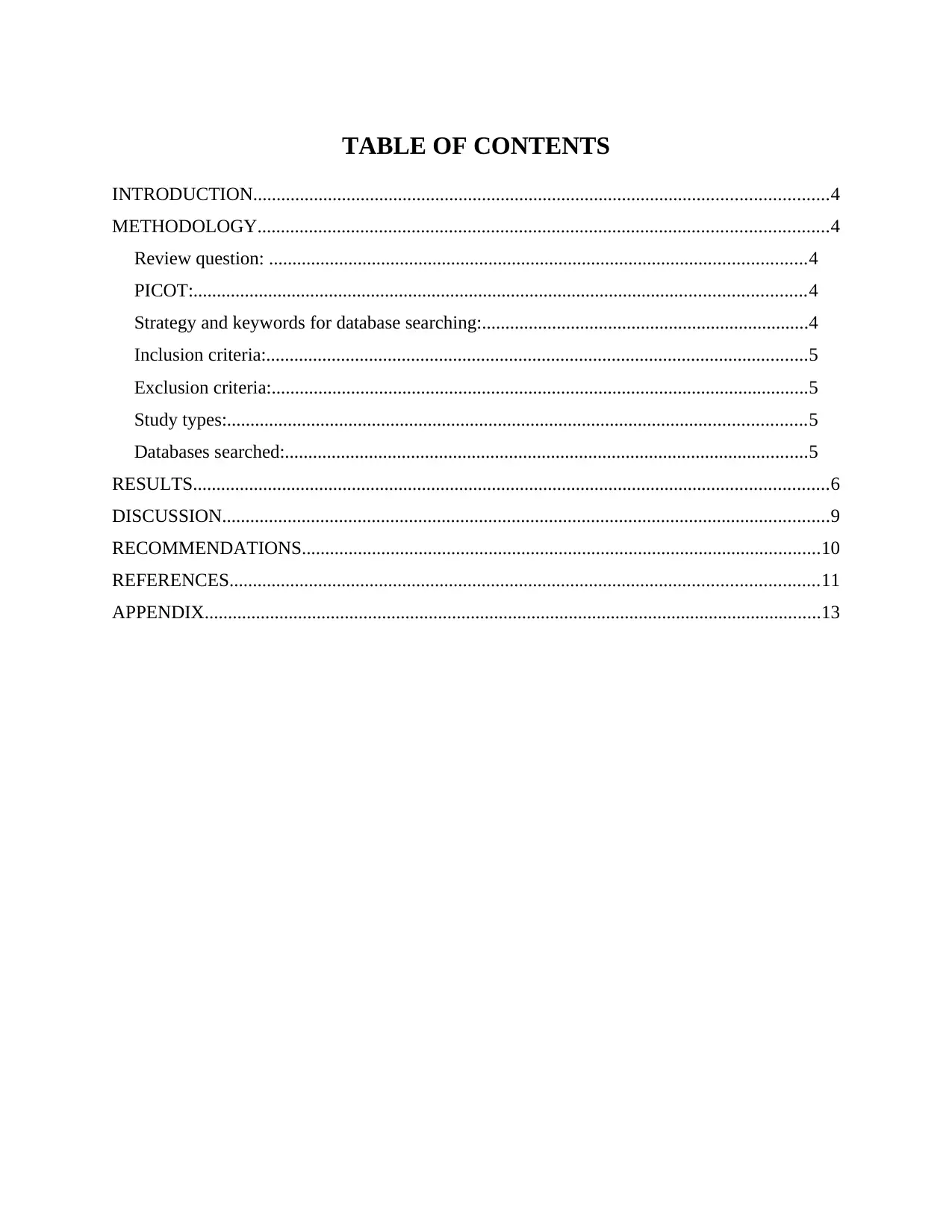
TABLE OF CONTENTS
INTRODUCTION...........................................................................................................................4
METHODOLOGY..........................................................................................................................4
Review question: ...................................................................................................................4
PICOT:...................................................................................................................................4
Strategy and keywords for database searching:......................................................................4
Inclusion criteria:....................................................................................................................5
Exclusion criteria:...................................................................................................................5
Study types:............................................................................................................................5
Databases searched:................................................................................................................5
RESULTS........................................................................................................................................6
DISCUSSION..................................................................................................................................9
RECOMMENDATIONS...............................................................................................................10
REFERENCES..............................................................................................................................11
APPENDIX....................................................................................................................................13
INTRODUCTION...........................................................................................................................4
METHODOLOGY..........................................................................................................................4
Review question: ...................................................................................................................4
PICOT:...................................................................................................................................4
Strategy and keywords for database searching:......................................................................4
Inclusion criteria:....................................................................................................................5
Exclusion criteria:...................................................................................................................5
Study types:............................................................................................................................5
Databases searched:................................................................................................................5
RESULTS........................................................................................................................................6
DISCUSSION..................................................................................................................................9
RECOMMENDATIONS...............................................................................................................10
REFERENCES..............................................................................................................................11
APPENDIX....................................................................................................................................13

Illustration Index
Illustration 1: PRISMA report format..............................................................................................6
Illustration 1: PRISMA report format..............................................................................................6
⊘ This is a preview!⊘
Do you want full access?
Subscribe today to unlock all pages.

Trusted by 1+ million students worldwide
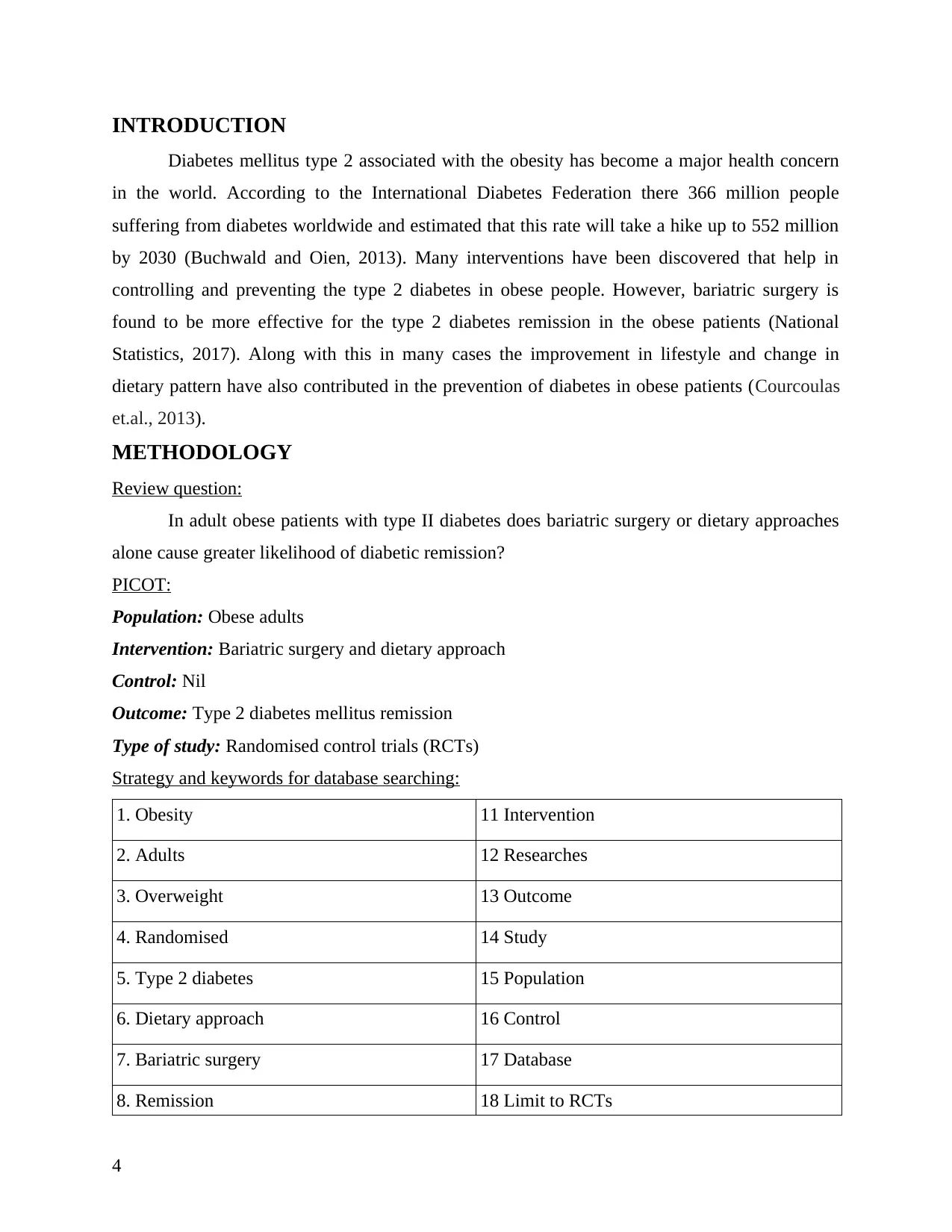
INTRODUCTION
Diabetes mellitus type 2 associated with the obesity has become a major health concern
in the world. According to the International Diabetes Federation there 366 million people
suffering from diabetes worldwide and estimated that this rate will take a hike up to 552 million
by 2030 (Buchwald and Oien, 2013). Many interventions have been discovered that help in
controlling and preventing the type 2 diabetes in obese people. However, bariatric surgery is
found to be more effective for the type 2 diabetes remission in the obese patients (National
Statistics, 2017). Along with this in many cases the improvement in lifestyle and change in
dietary pattern have also contributed in the prevention of diabetes in obese patients (Courcoulas
et.al., 2013).
METHODOLOGY
Review question:
In adult obese patients with type II diabetes does bariatric surgery or dietary approaches
alone cause greater likelihood of diabetic remission?
PICOT:
Population: Obese adults
Intervention: Bariatric surgery and dietary approach
Control: Nil
Outcome: Type 2 diabetes mellitus remission
Type of study: Randomised control trials (RCTs)
Strategy and keywords for database searching:
1. Obesity 11 Intervention
2. Adults 12 Researches
3. Overweight 13 Outcome
4. Randomised 14 Study
5. Type 2 diabetes 15 Population
6. Dietary approach 16 Control
7. Bariatric surgery 17 Database
8. Remission 18 Limit to RCTs
4
Diabetes mellitus type 2 associated with the obesity has become a major health concern
in the world. According to the International Diabetes Federation there 366 million people
suffering from diabetes worldwide and estimated that this rate will take a hike up to 552 million
by 2030 (Buchwald and Oien, 2013). Many interventions have been discovered that help in
controlling and preventing the type 2 diabetes in obese people. However, bariatric surgery is
found to be more effective for the type 2 diabetes remission in the obese patients (National
Statistics, 2017). Along with this in many cases the improvement in lifestyle and change in
dietary pattern have also contributed in the prevention of diabetes in obese patients (Courcoulas
et.al., 2013).
METHODOLOGY
Review question:
In adult obese patients with type II diabetes does bariatric surgery or dietary approaches
alone cause greater likelihood of diabetic remission?
PICOT:
Population: Obese adults
Intervention: Bariatric surgery and dietary approach
Control: Nil
Outcome: Type 2 diabetes mellitus remission
Type of study: Randomised control trials (RCTs)
Strategy and keywords for database searching:
1. Obesity 11 Intervention
2. Adults 12 Researches
3. Overweight 13 Outcome
4. Randomised 14 Study
5. Type 2 diabetes 15 Population
6. Dietary approach 16 Control
7. Bariatric surgery 17 Database
8. Remission 18 Limit to RCTs
4
Paraphrase This Document
Need a fresh take? Get an instant paraphrase of this document with our AI Paraphraser
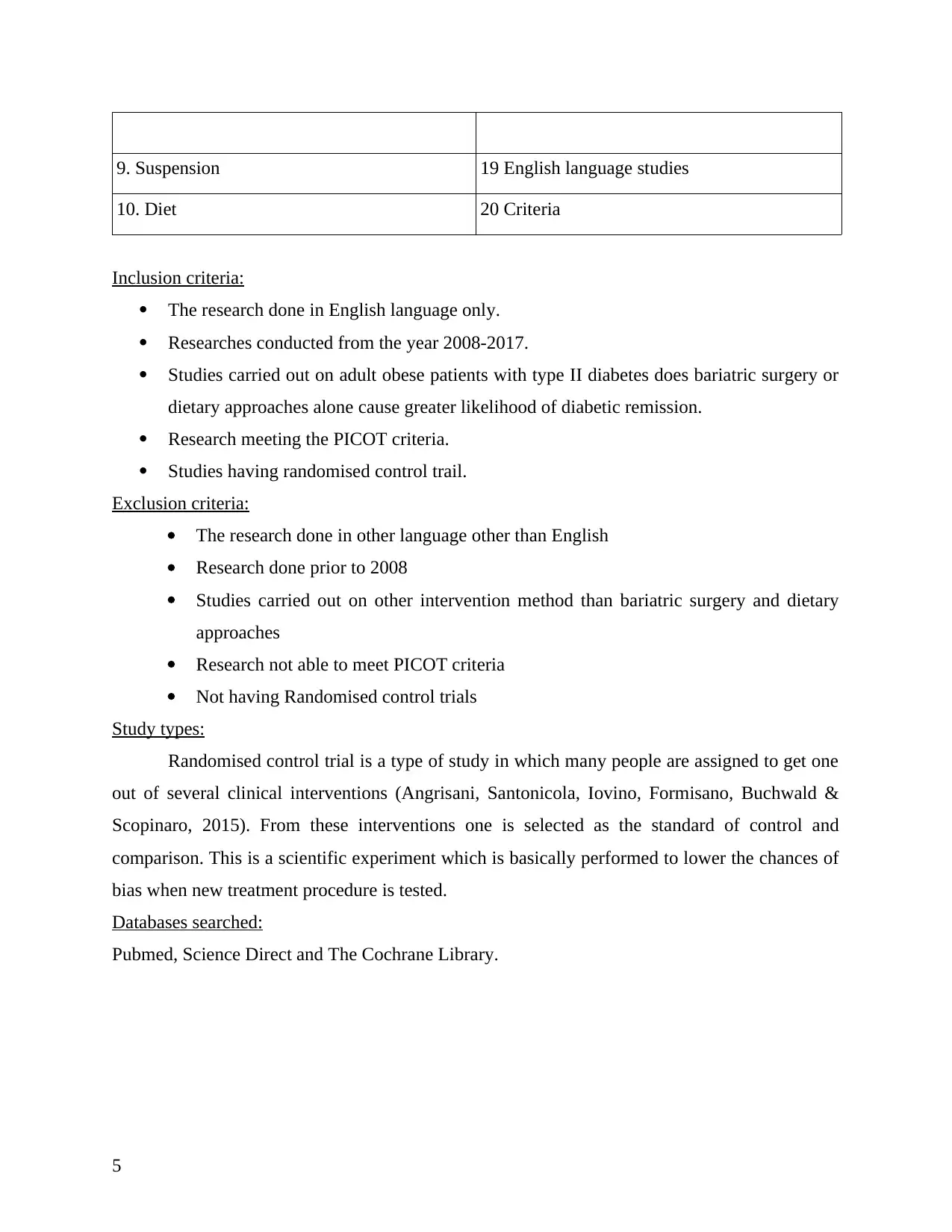
9. Suspension 19 English language studies
10. Diet 20 Criteria
Inclusion criteria:
The research done in English language only.
Researches conducted from the year 2008-2017.
Studies carried out on adult obese patients with type II diabetes does bariatric surgery or
dietary approaches alone cause greater likelihood of diabetic remission.
Research meeting the PICOT criteria.
Studies having randomised control trail.
Exclusion criteria:
The research done in other language other than English
Research done prior to 2008
Studies carried out on other intervention method than bariatric surgery and dietary
approaches
Research not able to meet PICOT criteria
Not having Randomised control trials
Study types:
Randomised control trial is a type of study in which many people are assigned to get one
out of several clinical interventions (Angrisani, Santonicola, Iovino, Formisano, Buchwald &
Scopinaro, 2015). From these interventions one is selected as the standard of control and
comparison. This is a scientific experiment which is basically performed to lower the chances of
bias when new treatment procedure is tested.
Databases searched:
Pubmed, Science Direct and The Cochrane Library.
5
10. Diet 20 Criteria
Inclusion criteria:
The research done in English language only.
Researches conducted from the year 2008-2017.
Studies carried out on adult obese patients with type II diabetes does bariatric surgery or
dietary approaches alone cause greater likelihood of diabetic remission.
Research meeting the PICOT criteria.
Studies having randomised control trail.
Exclusion criteria:
The research done in other language other than English
Research done prior to 2008
Studies carried out on other intervention method than bariatric surgery and dietary
approaches
Research not able to meet PICOT criteria
Not having Randomised control trials
Study types:
Randomised control trial is a type of study in which many people are assigned to get one
out of several clinical interventions (Angrisani, Santonicola, Iovino, Formisano, Buchwald &
Scopinaro, 2015). From these interventions one is selected as the standard of control and
comparison. This is a scientific experiment which is basically performed to lower the chances of
bias when new treatment procedure is tested.
Databases searched:
Pubmed, Science Direct and The Cochrane Library.
5
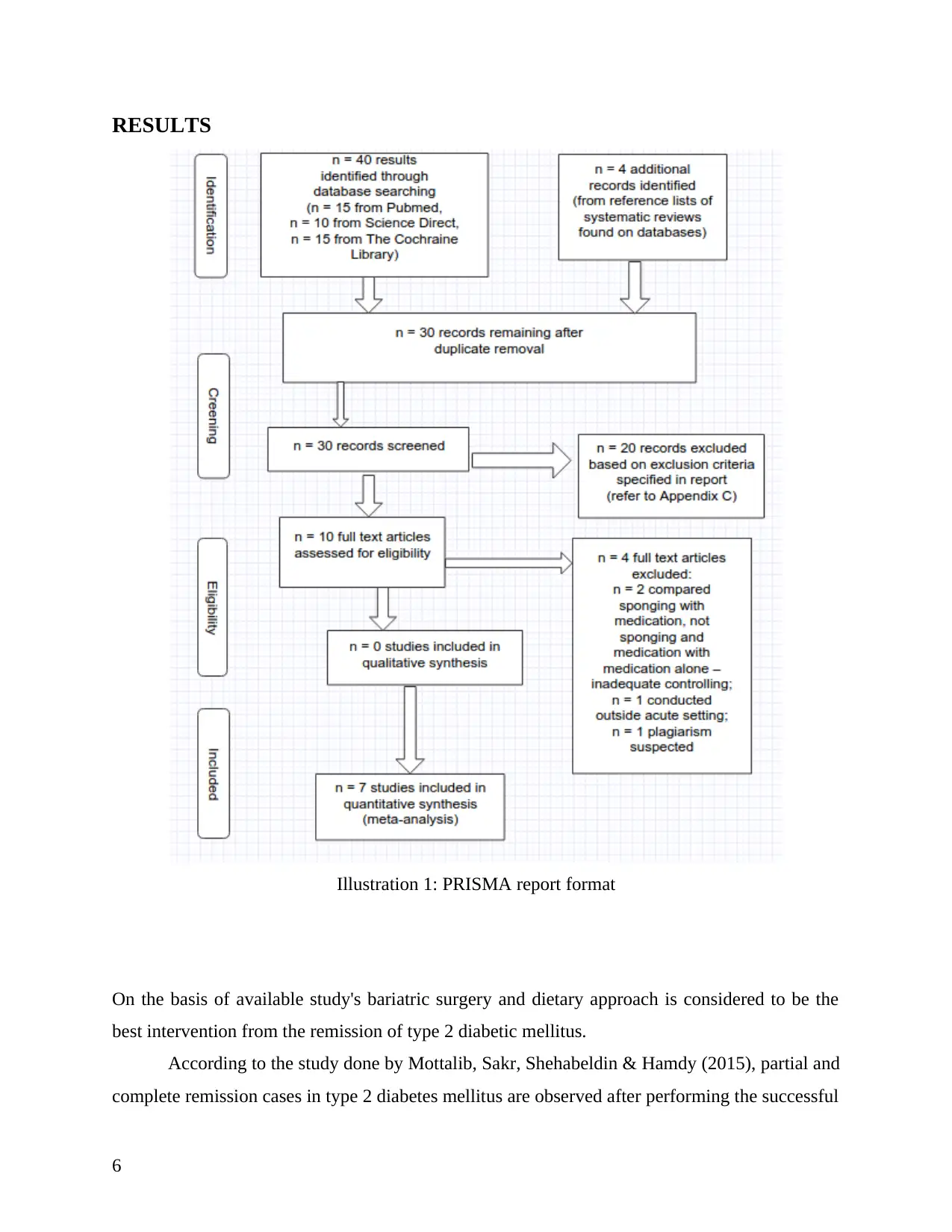
RESULTS
Illustration 1: PRISMA report format
On the basis of available study's bariatric surgery and dietary approach is considered to be the
best intervention from the remission of type 2 diabetic mellitus.
According to the study done by Mottalib, Sakr, Shehabeldin & Hamdy (2015), partial and
complete remission cases in type 2 diabetes mellitus are observed after performing the successful
6
Illustration 1: PRISMA report format
On the basis of available study's bariatric surgery and dietary approach is considered to be the
best intervention from the remission of type 2 diabetic mellitus.
According to the study done by Mottalib, Sakr, Shehabeldin & Hamdy (2015), partial and
complete remission cases in type 2 diabetes mellitus are observed after performing the successful
6
⊘ This is a preview!⊘
Do you want full access?
Subscribe today to unlock all pages.

Trusted by 1+ million students worldwide
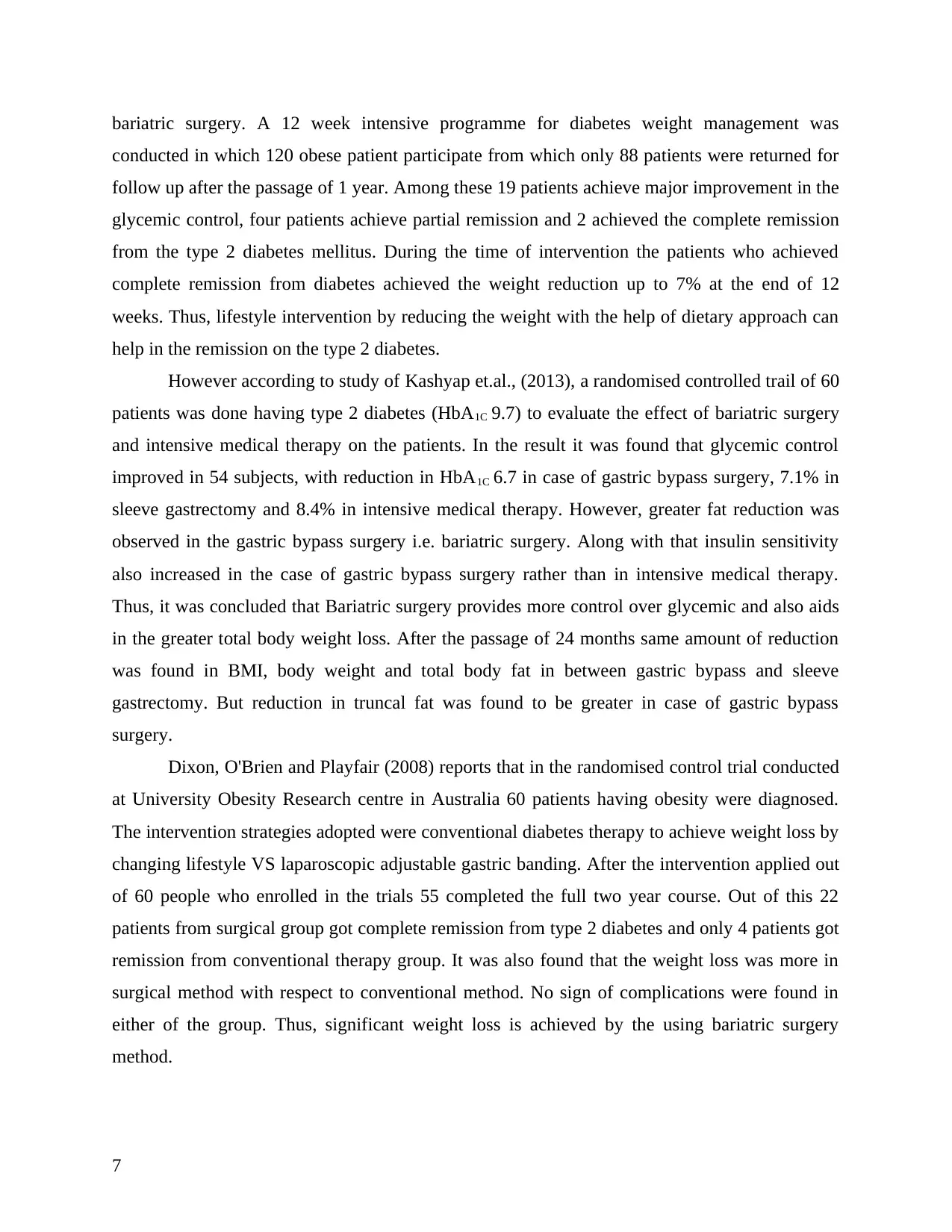
bariatric surgery. A 12 week intensive programme for diabetes weight management was
conducted in which 120 obese patient participate from which only 88 patients were returned for
follow up after the passage of 1 year. Among these 19 patients achieve major improvement in the
glycemic control, four patients achieve partial remission and 2 achieved the complete remission
from the type 2 diabetes mellitus. During the time of intervention the patients who achieved
complete remission from diabetes achieved the weight reduction up to 7% at the end of 12
weeks. Thus, lifestyle intervention by reducing the weight with the help of dietary approach can
help in the remission on the type 2 diabetes.
However according to study of Kashyap et.al., (2013), a randomised controlled trail of 60
patients was done having type 2 diabetes (HbA1C 9.7) to evaluate the effect of bariatric surgery
and intensive medical therapy on the patients. In the result it was found that glycemic control
improved in 54 subjects, with reduction in HbA1C 6.7 in case of gastric bypass surgery, 7.1% in
sleeve gastrectomy and 8.4% in intensive medical therapy. However, greater fat reduction was
observed in the gastric bypass surgery i.e. bariatric surgery. Along with that insulin sensitivity
also increased in the case of gastric bypass surgery rather than in intensive medical therapy.
Thus, it was concluded that Bariatric surgery provides more control over glycemic and also aids
in the greater total body weight loss. After the passage of 24 months same amount of reduction
was found in BMI, body weight and total body fat in between gastric bypass and sleeve
gastrectomy. But reduction in truncal fat was found to be greater in case of gastric bypass
surgery.
Dixon, O'Brien and Playfair (2008) reports that in the randomised control trial conducted
at University Obesity Research centre in Australia 60 patients having obesity were diagnosed.
The intervention strategies adopted were conventional diabetes therapy to achieve weight loss by
changing lifestyle VS laparoscopic adjustable gastric banding. After the intervention applied out
of 60 people who enrolled in the trials 55 completed the full two year course. Out of this 22
patients from surgical group got complete remission from type 2 diabetes and only 4 patients got
remission from conventional therapy group. It was also found that the weight loss was more in
surgical method with respect to conventional method. No sign of complications were found in
either of the group. Thus, significant weight loss is achieved by the using bariatric surgery
method.
7
conducted in which 120 obese patient participate from which only 88 patients were returned for
follow up after the passage of 1 year. Among these 19 patients achieve major improvement in the
glycemic control, four patients achieve partial remission and 2 achieved the complete remission
from the type 2 diabetes mellitus. During the time of intervention the patients who achieved
complete remission from diabetes achieved the weight reduction up to 7% at the end of 12
weeks. Thus, lifestyle intervention by reducing the weight with the help of dietary approach can
help in the remission on the type 2 diabetes.
However according to study of Kashyap et.al., (2013), a randomised controlled trail of 60
patients was done having type 2 diabetes (HbA1C 9.7) to evaluate the effect of bariatric surgery
and intensive medical therapy on the patients. In the result it was found that glycemic control
improved in 54 subjects, with reduction in HbA1C 6.7 in case of gastric bypass surgery, 7.1% in
sleeve gastrectomy and 8.4% in intensive medical therapy. However, greater fat reduction was
observed in the gastric bypass surgery i.e. bariatric surgery. Along with that insulin sensitivity
also increased in the case of gastric bypass surgery rather than in intensive medical therapy.
Thus, it was concluded that Bariatric surgery provides more control over glycemic and also aids
in the greater total body weight loss. After the passage of 24 months same amount of reduction
was found in BMI, body weight and total body fat in between gastric bypass and sleeve
gastrectomy. But reduction in truncal fat was found to be greater in case of gastric bypass
surgery.
Dixon, O'Brien and Playfair (2008) reports that in the randomised control trial conducted
at University Obesity Research centre in Australia 60 patients having obesity were diagnosed.
The intervention strategies adopted were conventional diabetes therapy to achieve weight loss by
changing lifestyle VS laparoscopic adjustable gastric banding. After the intervention applied out
of 60 people who enrolled in the trials 55 completed the full two year course. Out of this 22
patients from surgical group got complete remission from type 2 diabetes and only 4 patients got
remission from conventional therapy group. It was also found that the weight loss was more in
surgical method with respect to conventional method. No sign of complications were found in
either of the group. Thus, significant weight loss is achieved by the using bariatric surgery
method.
7
Paraphrase This Document
Need a fresh take? Get an instant paraphrase of this document with our AI Paraphraser
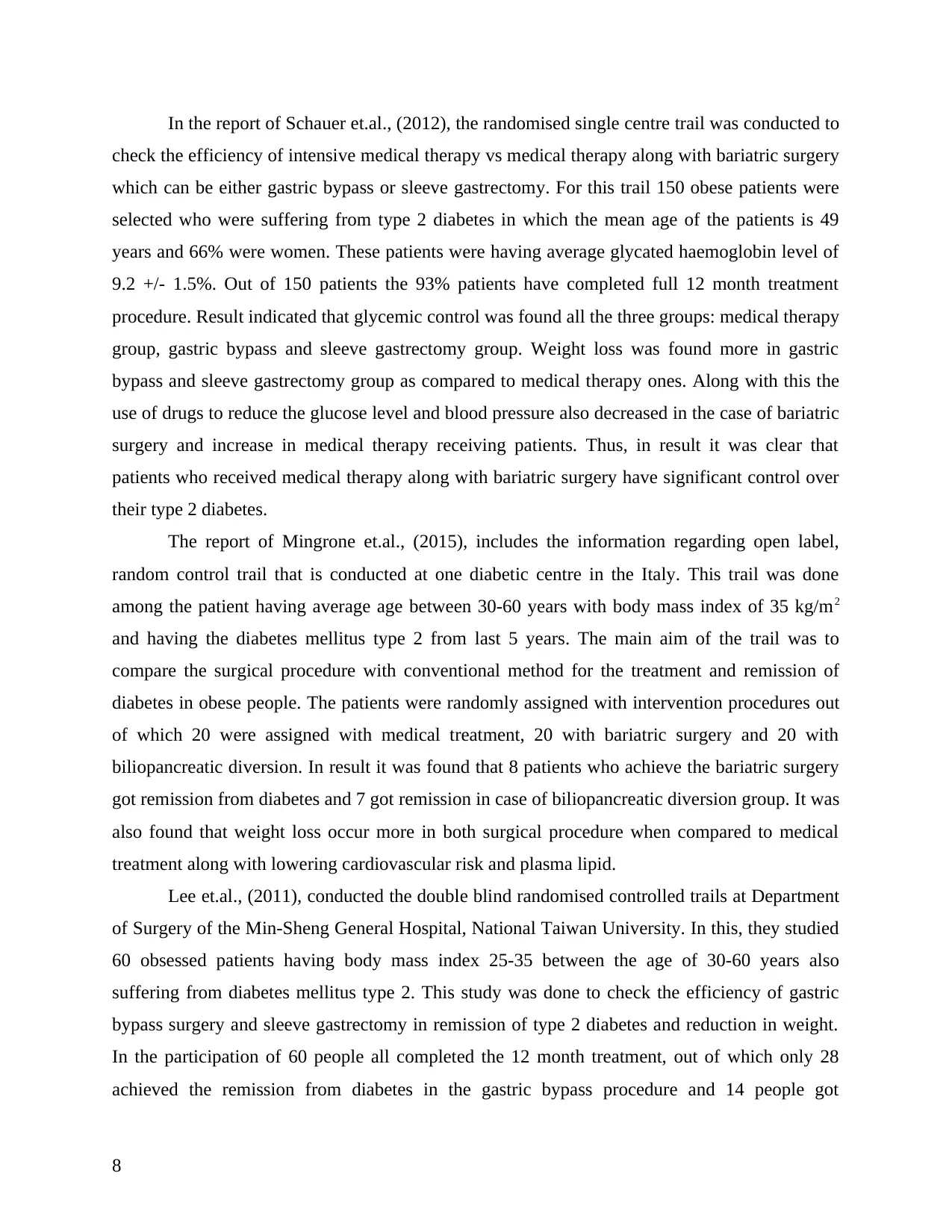
In the report of Schauer et.al., (2012), the randomised single centre trail was conducted to
check the efficiency of intensive medical therapy vs medical therapy along with bariatric surgery
which can be either gastric bypass or sleeve gastrectomy. For this trail 150 obese patients were
selected who were suffering from type 2 diabetes in which the mean age of the patients is 49
years and 66% were women. These patients were having average glycated haemoglobin level of
9.2 +/- 1.5%. Out of 150 patients the 93% patients have completed full 12 month treatment
procedure. Result indicated that glycemic control was found all the three groups: medical therapy
group, gastric bypass and sleeve gastrectomy group. Weight loss was found more in gastric
bypass and sleeve gastrectomy group as compared to medical therapy ones. Along with this the
use of drugs to reduce the glucose level and blood pressure also decreased in the case of bariatric
surgery and increase in medical therapy receiving patients. Thus, in result it was clear that
patients who received medical therapy along with bariatric surgery have significant control over
their type 2 diabetes.
The report of Mingrone et.al., (2015), includes the information regarding open label,
random control trail that is conducted at one diabetic centre in the Italy. This trail was done
among the patient having average age between 30-60 years with body mass index of 35 kg/m2
and having the diabetes mellitus type 2 from last 5 years. The main aim of the trail was to
compare the surgical procedure with conventional method for the treatment and remission of
diabetes in obese people. The patients were randomly assigned with intervention procedures out
of which 20 were assigned with medical treatment, 20 with bariatric surgery and 20 with
biliopancreatic diversion. In result it was found that 8 patients who achieve the bariatric surgery
got remission from diabetes and 7 got remission in case of biliopancreatic diversion group. It was
also found that weight loss occur more in both surgical procedure when compared to medical
treatment along with lowering cardiovascular risk and plasma lipid.
Lee et.al., (2011), conducted the double blind randomised controlled trails at Department
of Surgery of the Min-Sheng General Hospital, National Taiwan University. In this, they studied
60 obsessed patients having body mass index 25-35 between the age of 30-60 years also
suffering from diabetes mellitus type 2. This study was done to check the efficiency of gastric
bypass surgery and sleeve gastrectomy in remission of type 2 diabetes and reduction in weight.
In the participation of 60 people all completed the 12 month treatment, out of which only 28
achieved the remission from diabetes in the gastric bypass procedure and 14 people got
8
check the efficiency of intensive medical therapy vs medical therapy along with bariatric surgery
which can be either gastric bypass or sleeve gastrectomy. For this trail 150 obese patients were
selected who were suffering from type 2 diabetes in which the mean age of the patients is 49
years and 66% were women. These patients were having average glycated haemoglobin level of
9.2 +/- 1.5%. Out of 150 patients the 93% patients have completed full 12 month treatment
procedure. Result indicated that glycemic control was found all the three groups: medical therapy
group, gastric bypass and sleeve gastrectomy group. Weight loss was found more in gastric
bypass and sleeve gastrectomy group as compared to medical therapy ones. Along with this the
use of drugs to reduce the glucose level and blood pressure also decreased in the case of bariatric
surgery and increase in medical therapy receiving patients. Thus, in result it was clear that
patients who received medical therapy along with bariatric surgery have significant control over
their type 2 diabetes.
The report of Mingrone et.al., (2015), includes the information regarding open label,
random control trail that is conducted at one diabetic centre in the Italy. This trail was done
among the patient having average age between 30-60 years with body mass index of 35 kg/m2
and having the diabetes mellitus type 2 from last 5 years. The main aim of the trail was to
compare the surgical procedure with conventional method for the treatment and remission of
diabetes in obese people. The patients were randomly assigned with intervention procedures out
of which 20 were assigned with medical treatment, 20 with bariatric surgery and 20 with
biliopancreatic diversion. In result it was found that 8 patients who achieve the bariatric surgery
got remission from diabetes and 7 got remission in case of biliopancreatic diversion group. It was
also found that weight loss occur more in both surgical procedure when compared to medical
treatment along with lowering cardiovascular risk and plasma lipid.
Lee et.al., (2011), conducted the double blind randomised controlled trails at Department
of Surgery of the Min-Sheng General Hospital, National Taiwan University. In this, they studied
60 obsessed patients having body mass index 25-35 between the age of 30-60 years also
suffering from diabetes mellitus type 2. This study was done to check the efficiency of gastric
bypass surgery and sleeve gastrectomy in remission of type 2 diabetes and reduction in weight.
In the participation of 60 people all completed the 12 month treatment, out of which only 28
achieved the remission from diabetes in the gastric bypass procedure and 14 people got
8
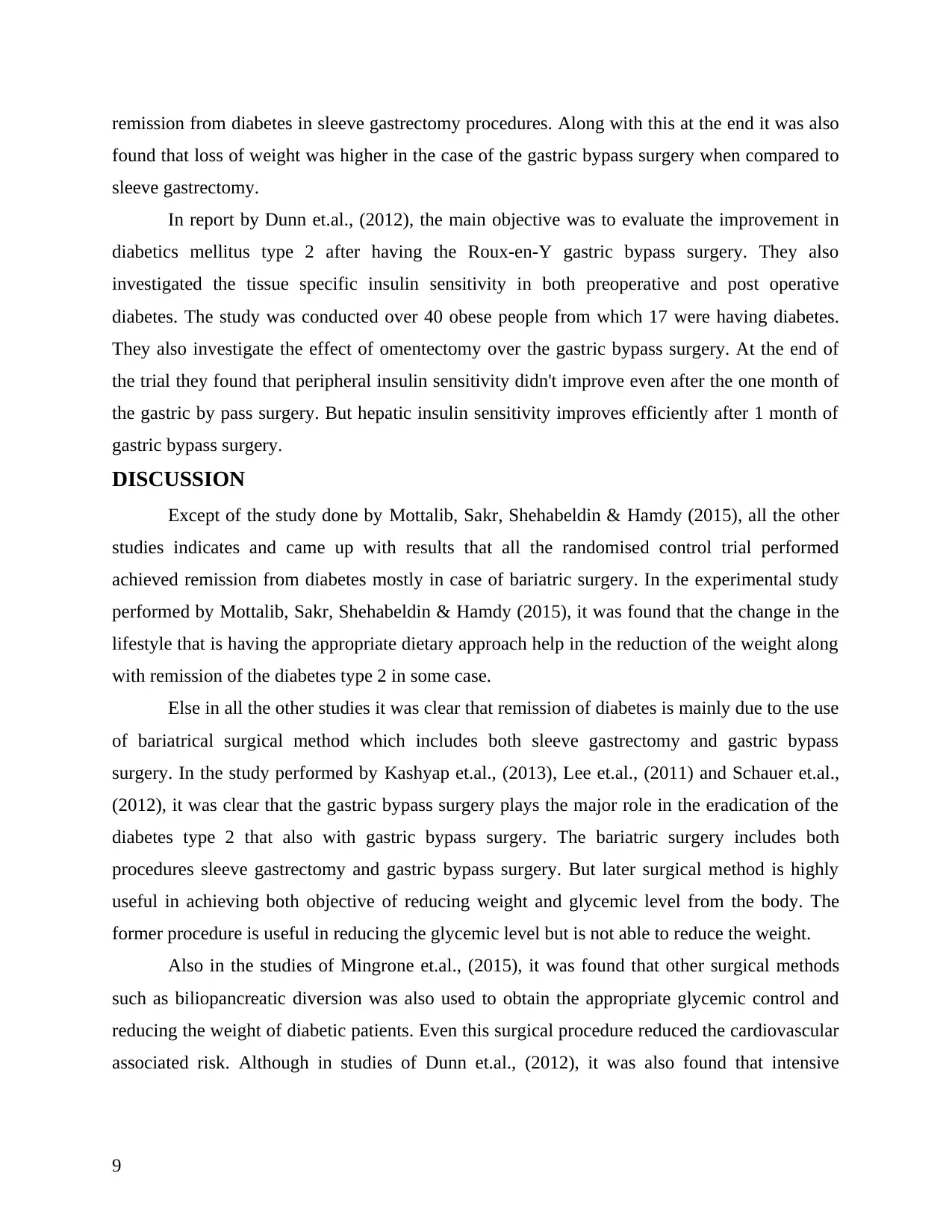
remission from diabetes in sleeve gastrectomy procedures. Along with this at the end it was also
found that loss of weight was higher in the case of the gastric bypass surgery when compared to
sleeve gastrectomy.
In report by Dunn et.al., (2012), the main objective was to evaluate the improvement in
diabetics mellitus type 2 after having the Roux-en-Y gastric bypass surgery. They also
investigated the tissue specific insulin sensitivity in both preoperative and post operative
diabetes. The study was conducted over 40 obese people from which 17 were having diabetes.
They also investigate the effect of omentectomy over the gastric bypass surgery. At the end of
the trial they found that peripheral insulin sensitivity didn't improve even after the one month of
the gastric by pass surgery. But hepatic insulin sensitivity improves efficiently after 1 month of
gastric bypass surgery.
DISCUSSION
Except of the study done by Mottalib, Sakr, Shehabeldin & Hamdy (2015), all the other
studies indicates and came up with results that all the randomised control trial performed
achieved remission from diabetes mostly in case of bariatric surgery. In the experimental study
performed by Mottalib, Sakr, Shehabeldin & Hamdy (2015), it was found that the change in the
lifestyle that is having the appropriate dietary approach help in the reduction of the weight along
with remission of the diabetes type 2 in some case.
Else in all the other studies it was clear that remission of diabetes is mainly due to the use
of bariatrical surgical method which includes both sleeve gastrectomy and gastric bypass
surgery. In the study performed by Kashyap et.al., (2013), Lee et.al., (2011) and Schauer et.al.,
(2012), it was clear that the gastric bypass surgery plays the major role in the eradication of the
diabetes type 2 that also with gastric bypass surgery. The bariatric surgery includes both
procedures sleeve gastrectomy and gastric bypass surgery. But later surgical method is highly
useful in achieving both objective of reducing weight and glycemic level from the body. The
former procedure is useful in reducing the glycemic level but is not able to reduce the weight.
Also in the studies of Mingrone et.al., (2015), it was found that other surgical methods
such as biliopancreatic diversion was also used to obtain the appropriate glycemic control and
reducing the weight of diabetic patients. Even this surgical procedure reduced the cardiovascular
associated risk. Although in studies of Dunn et.al., (2012), it was also found that intensive
9
found that loss of weight was higher in the case of the gastric bypass surgery when compared to
sleeve gastrectomy.
In report by Dunn et.al., (2012), the main objective was to evaluate the improvement in
diabetics mellitus type 2 after having the Roux-en-Y gastric bypass surgery. They also
investigated the tissue specific insulin sensitivity in both preoperative and post operative
diabetes. The study was conducted over 40 obese people from which 17 were having diabetes.
They also investigate the effect of omentectomy over the gastric bypass surgery. At the end of
the trial they found that peripheral insulin sensitivity didn't improve even after the one month of
the gastric by pass surgery. But hepatic insulin sensitivity improves efficiently after 1 month of
gastric bypass surgery.
DISCUSSION
Except of the study done by Mottalib, Sakr, Shehabeldin & Hamdy (2015), all the other
studies indicates and came up with results that all the randomised control trial performed
achieved remission from diabetes mostly in case of bariatric surgery. In the experimental study
performed by Mottalib, Sakr, Shehabeldin & Hamdy (2015), it was found that the change in the
lifestyle that is having the appropriate dietary approach help in the reduction of the weight along
with remission of the diabetes type 2 in some case.
Else in all the other studies it was clear that remission of diabetes is mainly due to the use
of bariatrical surgical method which includes both sleeve gastrectomy and gastric bypass
surgery. In the study performed by Kashyap et.al., (2013), Lee et.al., (2011) and Schauer et.al.,
(2012), it was clear that the gastric bypass surgery plays the major role in the eradication of the
diabetes type 2 that also with gastric bypass surgery. The bariatric surgery includes both
procedures sleeve gastrectomy and gastric bypass surgery. But later surgical method is highly
useful in achieving both objective of reducing weight and glycemic level from the body. The
former procedure is useful in reducing the glycemic level but is not able to reduce the weight.
Also in the studies of Mingrone et.al., (2015), it was found that other surgical methods
such as biliopancreatic diversion was also used to obtain the appropriate glycemic control and
reducing the weight of diabetic patients. Even this surgical procedure reduced the cardiovascular
associated risk. Although in studies of Dunn et.al., (2012), it was also found that intensive
9
⊘ This is a preview!⊘
Do you want full access?
Subscribe today to unlock all pages.

Trusted by 1+ million students worldwide
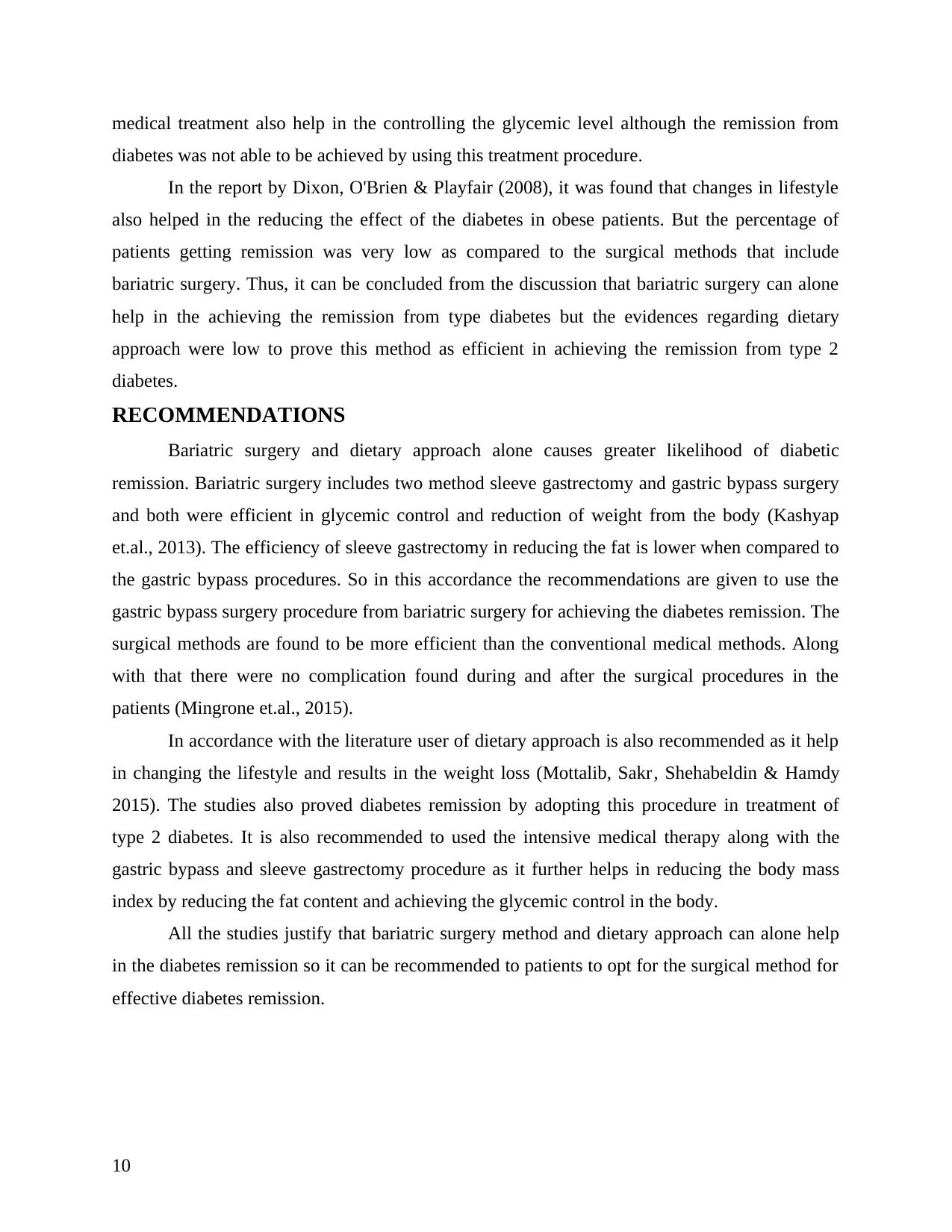
medical treatment also help in the controlling the glycemic level although the remission from
diabetes was not able to be achieved by using this treatment procedure.
In the report by Dixon, O'Brien & Playfair (2008), it was found that changes in lifestyle
also helped in the reducing the effect of the diabetes in obese patients. But the percentage of
patients getting remission was very low as compared to the surgical methods that include
bariatric surgery. Thus, it can be concluded from the discussion that bariatric surgery can alone
help in the achieving the remission from type diabetes but the evidences regarding dietary
approach were low to prove this method as efficient in achieving the remission from type 2
diabetes.
RECOMMENDATIONS
Bariatric surgery and dietary approach alone causes greater likelihood of diabetic
remission. Bariatric surgery includes two method sleeve gastrectomy and gastric bypass surgery
and both were efficient in glycemic control and reduction of weight from the body (Kashyap
et.al., 2013). The efficiency of sleeve gastrectomy in reducing the fat is lower when compared to
the gastric bypass procedures. So in this accordance the recommendations are given to use the
gastric bypass surgery procedure from bariatric surgery for achieving the diabetes remission. The
surgical methods are found to be more efficient than the conventional medical methods. Along
with that there were no complication found during and after the surgical procedures in the
patients (Mingrone et.al., 2015).
In accordance with the literature user of dietary approach is also recommended as it help
in changing the lifestyle and results in the weight loss (Mottalib, Sakr, Shehabeldin & Hamdy
2015). The studies also proved diabetes remission by adopting this procedure in treatment of
type 2 diabetes. It is also recommended to used the intensive medical therapy along with the
gastric bypass and sleeve gastrectomy procedure as it further helps in reducing the body mass
index by reducing the fat content and achieving the glycemic control in the body.
All the studies justify that bariatric surgery method and dietary approach can alone help
in the diabetes remission so it can be recommended to patients to opt for the surgical method for
effective diabetes remission.
10
diabetes was not able to be achieved by using this treatment procedure.
In the report by Dixon, O'Brien & Playfair (2008), it was found that changes in lifestyle
also helped in the reducing the effect of the diabetes in obese patients. But the percentage of
patients getting remission was very low as compared to the surgical methods that include
bariatric surgery. Thus, it can be concluded from the discussion that bariatric surgery can alone
help in the achieving the remission from type diabetes but the evidences regarding dietary
approach were low to prove this method as efficient in achieving the remission from type 2
diabetes.
RECOMMENDATIONS
Bariatric surgery and dietary approach alone causes greater likelihood of diabetic
remission. Bariatric surgery includes two method sleeve gastrectomy and gastric bypass surgery
and both were efficient in glycemic control and reduction of weight from the body (Kashyap
et.al., 2013). The efficiency of sleeve gastrectomy in reducing the fat is lower when compared to
the gastric bypass procedures. So in this accordance the recommendations are given to use the
gastric bypass surgery procedure from bariatric surgery for achieving the diabetes remission. The
surgical methods are found to be more efficient than the conventional medical methods. Along
with that there were no complication found during and after the surgical procedures in the
patients (Mingrone et.al., 2015).
In accordance with the literature user of dietary approach is also recommended as it help
in changing the lifestyle and results in the weight loss (Mottalib, Sakr, Shehabeldin & Hamdy
2015). The studies also proved diabetes remission by adopting this procedure in treatment of
type 2 diabetes. It is also recommended to used the intensive medical therapy along with the
gastric bypass and sleeve gastrectomy procedure as it further helps in reducing the body mass
index by reducing the fat content and achieving the glycemic control in the body.
All the studies justify that bariatric surgery method and dietary approach can alone help
in the diabetes remission so it can be recommended to patients to opt for the surgical method for
effective diabetes remission.
10
Paraphrase This Document
Need a fresh take? Get an instant paraphrase of this document with our AI Paraphraser
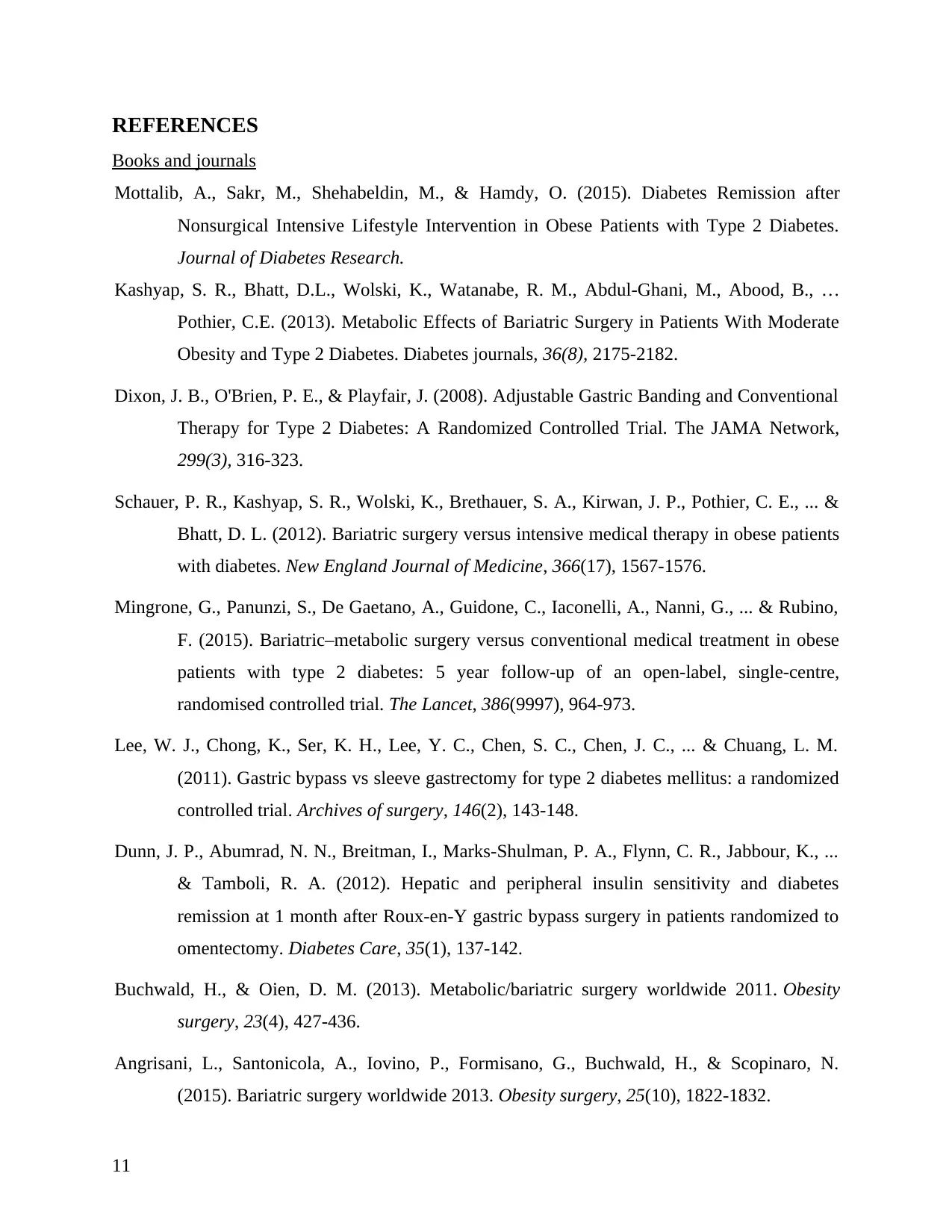
REFERENCES
Books and journals
Mottalib, A., Sakr, M., Shehabeldin, M., & Hamdy, O. (2015). Diabetes Remission after
Nonsurgical Intensive Lifestyle Intervention in Obese Patients with Type 2 Diabetes.
Journal of Diabetes Research.
Kashyap, S. R., Bhatt, D.L., Wolski, K., Watanabe, R. M., Abdul-Ghani, M., Abood, B., …
Pothier, C.E. (2013). Metabolic Effects of Bariatric Surgery in Patients With Moderate
Obesity and Type 2 Diabetes. Diabetes journals, 36(8), 2175-2182.
Dixon, J. B., O'Brien, P. E., & Playfair, J. (2008). Adjustable Gastric Banding and Conventional
Therapy for Type 2 Diabetes: A Randomized Controlled Trial. The JAMA Network,
299(3), 316-323.
Schauer, P. R., Kashyap, S. R., Wolski, K., Brethauer, S. A., Kirwan, J. P., Pothier, C. E., ... &
Bhatt, D. L. (2012). Bariatric surgery versus intensive medical therapy in obese patients
with diabetes. New England Journal of Medicine, 366(17), 1567-1576.
Mingrone, G., Panunzi, S., De Gaetano, A., Guidone, C., Iaconelli, A., Nanni, G., ... & Rubino,
F. (2015). Bariatric–metabolic surgery versus conventional medical treatment in obese
patients with type 2 diabetes: 5 year follow-up of an open-label, single-centre,
randomised controlled trial. The Lancet, 386(9997), 964-973.
Lee, W. J., Chong, K., Ser, K. H., Lee, Y. C., Chen, S. C., Chen, J. C., ... & Chuang, L. M.
(2011). Gastric bypass vs sleeve gastrectomy for type 2 diabetes mellitus: a randomized
controlled trial. Archives of surgery, 146(2), 143-148.
Dunn, J. P., Abumrad, N. N., Breitman, I., Marks-Shulman, P. A., Flynn, C. R., Jabbour, K., ...
& Tamboli, R. A. (2012). Hepatic and peripheral insulin sensitivity and diabetes
remission at 1 month after Roux-en-Y gastric bypass surgery in patients randomized to
omentectomy. Diabetes Care, 35(1), 137-142.
Buchwald, H., & Oien, D. M. (2013). Metabolic/bariatric surgery worldwide 2011. Obesity
surgery, 23(4), 427-436.
Angrisani, L., Santonicola, A., Iovino, P., Formisano, G., Buchwald, H., & Scopinaro, N.
(2015). Bariatric surgery worldwide 2013. Obesity surgery, 25(10), 1822-1832.
11
Books and journals
Mottalib, A., Sakr, M., Shehabeldin, M., & Hamdy, O. (2015). Diabetes Remission after
Nonsurgical Intensive Lifestyle Intervention in Obese Patients with Type 2 Diabetes.
Journal of Diabetes Research.
Kashyap, S. R., Bhatt, D.L., Wolski, K., Watanabe, R. M., Abdul-Ghani, M., Abood, B., …
Pothier, C.E. (2013). Metabolic Effects of Bariatric Surgery in Patients With Moderate
Obesity and Type 2 Diabetes. Diabetes journals, 36(8), 2175-2182.
Dixon, J. B., O'Brien, P. E., & Playfair, J. (2008). Adjustable Gastric Banding and Conventional
Therapy for Type 2 Diabetes: A Randomized Controlled Trial. The JAMA Network,
299(3), 316-323.
Schauer, P. R., Kashyap, S. R., Wolski, K., Brethauer, S. A., Kirwan, J. P., Pothier, C. E., ... &
Bhatt, D. L. (2012). Bariatric surgery versus intensive medical therapy in obese patients
with diabetes. New England Journal of Medicine, 366(17), 1567-1576.
Mingrone, G., Panunzi, S., De Gaetano, A., Guidone, C., Iaconelli, A., Nanni, G., ... & Rubino,
F. (2015). Bariatric–metabolic surgery versus conventional medical treatment in obese
patients with type 2 diabetes: 5 year follow-up of an open-label, single-centre,
randomised controlled trial. The Lancet, 386(9997), 964-973.
Lee, W. J., Chong, K., Ser, K. H., Lee, Y. C., Chen, S. C., Chen, J. C., ... & Chuang, L. M.
(2011). Gastric bypass vs sleeve gastrectomy for type 2 diabetes mellitus: a randomized
controlled trial. Archives of surgery, 146(2), 143-148.
Dunn, J. P., Abumrad, N. N., Breitman, I., Marks-Shulman, P. A., Flynn, C. R., Jabbour, K., ...
& Tamboli, R. A. (2012). Hepatic and peripheral insulin sensitivity and diabetes
remission at 1 month after Roux-en-Y gastric bypass surgery in patients randomized to
omentectomy. Diabetes Care, 35(1), 137-142.
Buchwald, H., & Oien, D. M. (2013). Metabolic/bariatric surgery worldwide 2011. Obesity
surgery, 23(4), 427-436.
Angrisani, L., Santonicola, A., Iovino, P., Formisano, G., Buchwald, H., & Scopinaro, N.
(2015). Bariatric surgery worldwide 2013. Obesity surgery, 25(10), 1822-1832.
11
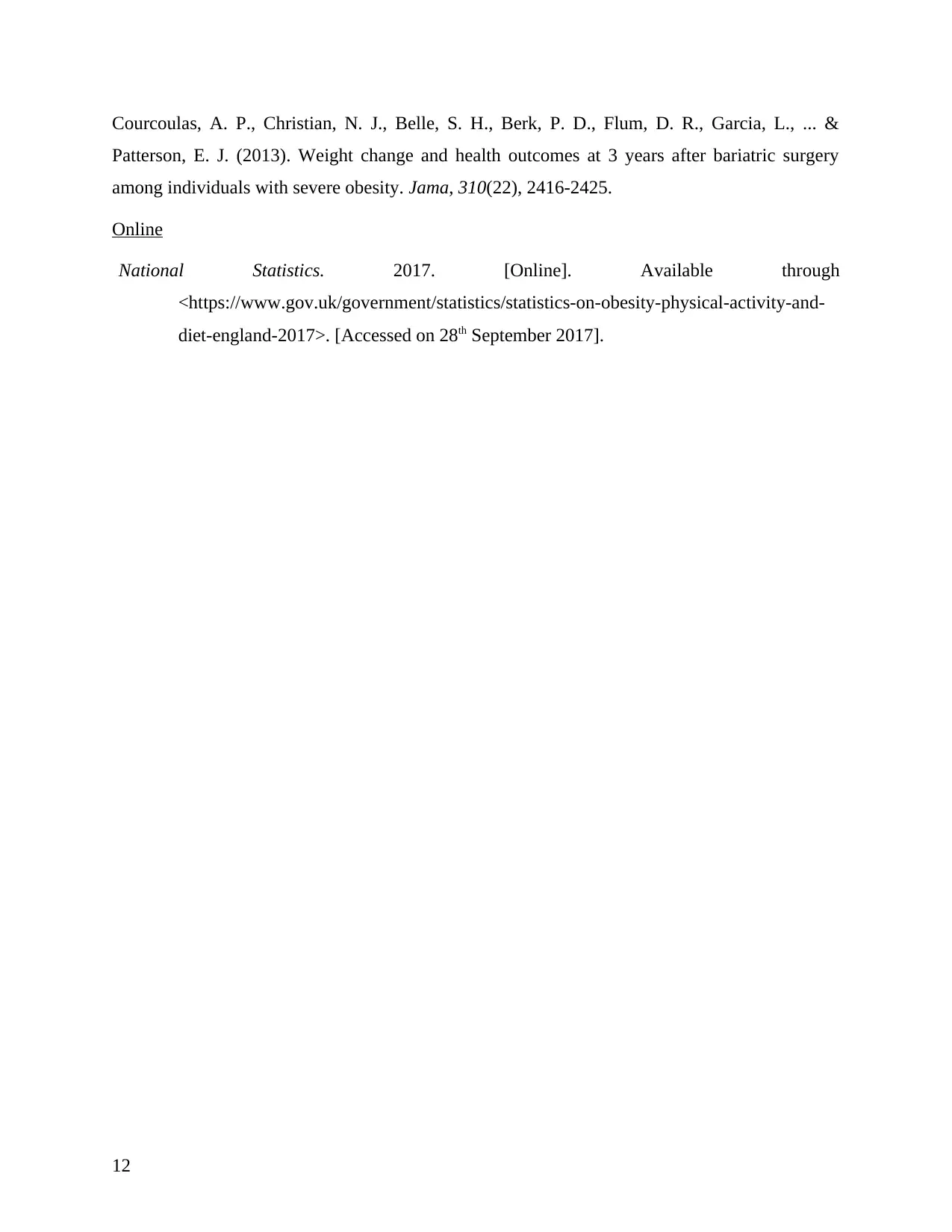
Courcoulas, A. P., Christian, N. J., Belle, S. H., Berk, P. D., Flum, D. R., Garcia, L., ... &
Patterson, E. J. (2013). Weight change and health outcomes at 3 years after bariatric surgery
among individuals with severe obesity. Jama, 310(22), 2416-2425.
Online
National Statistics. 2017. [Online]. Available through
<https://www.gov.uk/government/statistics/statistics-on-obesity-physical-activity-and-
diet-england-2017>. [Accessed on 28th September 2017].
12
Patterson, E. J. (2013). Weight change and health outcomes at 3 years after bariatric surgery
among individuals with severe obesity. Jama, 310(22), 2416-2425.
Online
National Statistics. 2017. [Online]. Available through
<https://www.gov.uk/government/statistics/statistics-on-obesity-physical-activity-and-
diet-england-2017>. [Accessed on 28th September 2017].
12
⊘ This is a preview!⊘
Do you want full access?
Subscribe today to unlock all pages.

Trusted by 1+ million students worldwide
1 out of 28
Related Documents
Your All-in-One AI-Powered Toolkit for Academic Success.
+13062052269
info@desklib.com
Available 24*7 on WhatsApp / Email
![[object Object]](/_next/static/media/star-bottom.7253800d.svg)
Unlock your academic potential
Copyright © 2020–2026 A2Z Services. All Rights Reserved. Developed and managed by ZUCOL.





